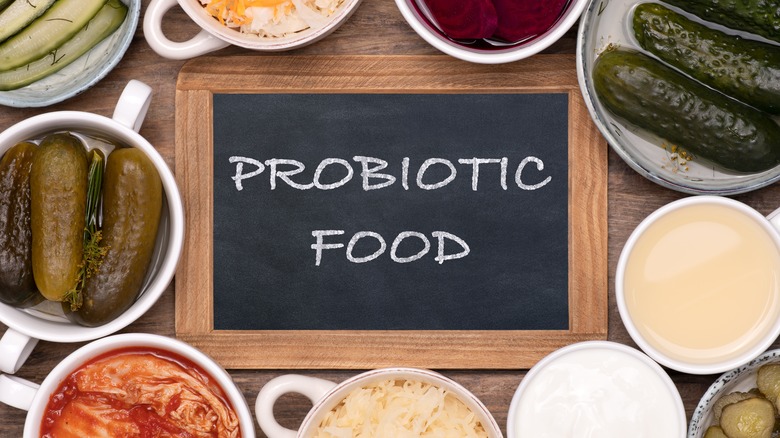Prebiotics Versus Probiotics: What's The Difference?
Prebiotics and probiotics help the gut microbiome — the microbes associated with the human digestive tract — stay balanced, according to 2014 research published in Integrative Medicine: A Clinician's Journal (IMCJ). Your gut flora affects several bodily processes such as your metabolism, physiology, and immune function. When there is an imbalance, it could take a toll on your health resulting in an array of conditions ranging from metabolic disease to eczema (via IMCJ).
Prebiotics are ingredients that your body does not digest (mostly fiber), and they help promote the growth of good bacteria, which not only improves gut health but has positive implications for your overall health. Research also indicates that prebiotics are especially beneficial in the treatment of irritable bowel syndrome, per Verywell Health. Foods in which prebiotics occur naturally include garlic, onions, chicory root, bananas, and apples, according to WebMD.
Probiotics are found in fermented foods
Unlike prebiotics that the body does not digest, probiotics are live bacteria and yeasts found in certain foods and supplements (via the Cleveland Clinic). Probiotics help your body digest food and fight inflammation. They keep bad bacteria under control, and they keep them from entering your bloodstream. Probiotics can also help alleviate conditions such as diarrhea, constipation, inflammatory bowel disease, irritable bowel disease, and lactose intolerance. You can find these healthy bacteria in fermented foods such as yogurt, kefir, kimchi, and miso. That being said, if you eat a healthy, balanced diet, you don't need to worry about taking probiotics, per the Cleveland Clinic.
Most people can add prebiotics and probiotics to their diet without any problems (via Verywell Health). You may have some bloating or gas when you first start ingesting them, but that should go away as your body adapts. If you have any kind of gastrointestinal disorder, discuss any concerns you have with your doctor.


